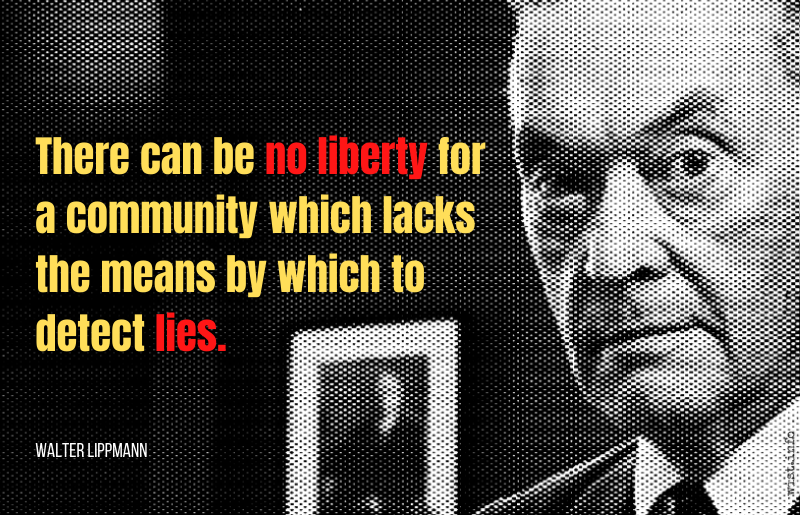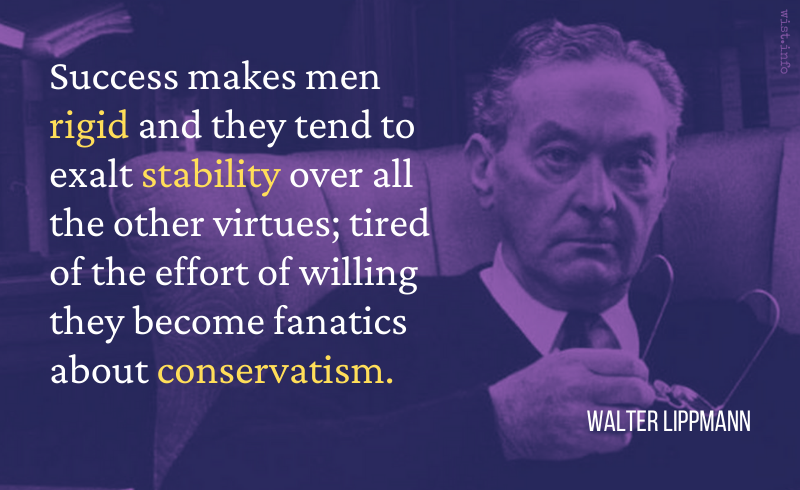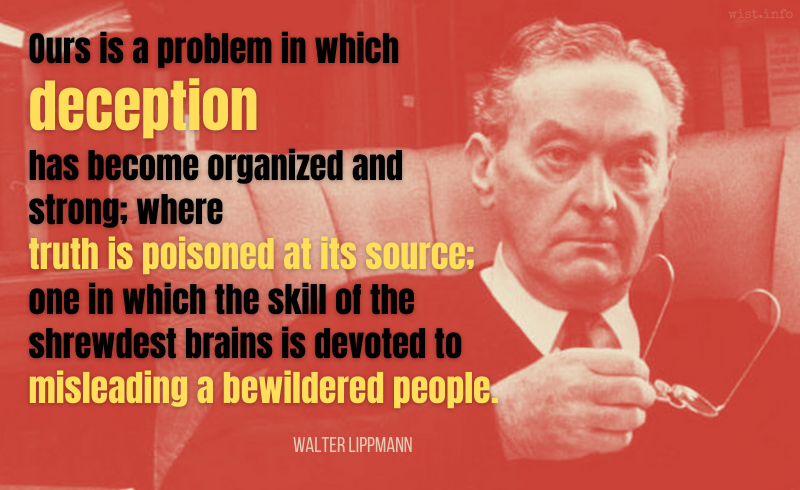Quotations by:
Lippmann, Walter
With exceptions so rare they are regarded as miracles of nature, successful democratic politicians are insecure and intimidated men. They advance politically only as they placate, appease, bribe, seduce, bamboozle, or otherwise manage to manipulate the demanding and threatening elements in their constituencies. The decisive consideration is not whether the proposition is good but whether it is popular — not whether it will work well and prove itself but whether the active talking constituents like it immediately. Politicians rationalize this servitude by saying that in a democracy public men are the servants of the people.
Walter Lippmann (1889-1974) American journalist and author
“The Democratic Malady,” The Public Philosophy (1955)
(Source)
This is the way of greatness. In the supreme moments of history, terms like duty, truth, justice, and mercy — which in our torpid hours are tired words — become the measure of decision. … The straight and righteous path is the shortest and the surest.
Walter Lippmann (1889-1974) American journalist and author
“The Fascination of Greatness,” Today and Tomorrow (7 Sep 1943)
(Source)
When men are brought face to face with their opponents, forced to listen and learn and mend their ideas, they cease to be children and savages and begin to live like civilized men. Then only is freedom a reality, when men may voice their opinions because they must examine their opinions.
Walter Lippmann (1889-1974) American journalist and author
“The Indispensable Opposition,” The Atlantic Monthly (Aug 1939)
(Source)
The national unity of a free people depends upon a sufficiently even balance of political power to make it impracticable for the administration to be arbitrary and for the opposition to be revolutionary and irreconcilable. Where that balance no longer exists, democracy perishes. For unless all the citizens of a state are forced by circumstances to compromise, unless they feel that they can affect policy but that no one can wholly dominate it, unless by habit and necessity they have to give and take, freedom cannot be maintained.
Walter Lippmann (1889-1974) American journalist and author
“The Indispensable Opposition,” The Atlantic Monthly (Aug 1939)
(Source)
There can be no liberty for a community which lacks the means by which to detect lies.
Walter Lippmann (1889-1974) American journalist and author
“What Modern Liberty Means,” Liberty and the News (1920)
(Source)
I generalized rashly: That is what kills political writing, this absurd pretence that you are delivering a great utterance. You never do. You are just a puzzled man making notes about what you think. You are not building the Pantheon, then why act like a graven image? You are drawing sketches in the sand which the sea will wash away.
He has honor if he holds himself to an ideal of conduct though it is inconvenient, unprofitable, or dangerous to do so.
It is all very well to talk about being the captain of your soul. It is hard, and only a few heroes, saints, and geniuses have been the captains of their souls for any extended period of their lives. Most men, after a little freedom, have preferred authority with the consoling assurances and the economy of effort it brings.
Walter Lippmann (1889-1974) American journalist and author
A Preface to Morals, ch. 1, sec. 3 (1929)
(Source)
Whether or not birth control is eugenic, hygienic, and economic, it is the most revolutionary practice in the history of sexual morals.
Walter Lippmann (1889-1974) American journalist and author
A Preface To Morals, ch. 19 (1929)
(Source)
Once you touch the biographies of human beings, the notion that political beliefs are logically determined collapses like a pricked balloon.
Walter Lippmann (1889-1974) American journalist and author
A Preface to Morals, ch. 7 (1913)
(Source)
The radical novelty of modern science lies precisely in the rejection of the belief, which is at the heart of all popular religion, that the forces which move the stars and atoms are contingent upon the preferences of the human heart.
Walter Lippmann (1889-1974) American journalist and author
A Preface to Morals, Part 1, ch. 7 (1929)
(Source)
The emotion of love, in spite of the romantics, is not self-sustaining; it endures only when the lovers love many things together and not merely each other.
Walter Lippmann (1889-1974) American journalist and author
A Preface to Morals, Part III, ch. 14 “Love in the Great Society” (1929)
Usually elided as "Love endures only when ..." Full text.
Religion, patriotism, race, and sex are the favorite red herrings of foul political method — they are the most successful because they explode so easily and flood the mind with those unconscious prejudices which make critical thinking difficult.
Success makes men rigid and they tend to exalt stability over all the other virtues; tired of the effort of willing they become fanatics about conservatism.
Walter Lippmann (1889-1974) American journalist and author
A Preface to Politics, ch. 1 (1914)
(Source)
Ours is a problem in which deception has become organized and strong; where truth is poisoned at its source; one in which the skill of the shrewdest brains is devoted to misleading a bewildered people.
Walter Lippmann (1889-1974) American journalist and author
A Preface to Politics, ch. 4 (1913)
(Source)
I have always thought that Machiavelli derives his bad name from a too transparent honesty. Less direct minds would have found high-sounding ethical sanctions in which to conceal the real intent. … Machiavelli’s morals are not one bit worse than the practices of the men who rules the world today.
Walter Lippmann (1889-1974) American journalist and author
A Preface to Politics, ch. 7 (1913)
Full text.
Culture is the name for what people are interested in, their thoughts, their models, the books they read and the speeches they hear, their table-talk, gossip controversies, historical sense and scientific training, the values they appreciate, the quality of life they admire. All communities have a culture. It is the climate of their civilization.
Walter Lippmann (1889-1974) American journalist and author
A Preface to Politics, ch. 9 “Revolution and Culture” (1913)
(Source)
The responsibility for insurrections rests in the last analysis upon the unimaginative greed and endless stupidity of the dominant classes. […] Confronted with the deep insurgency of labor what do capitalists and their spokesmen do? They resist every demand, submit only after a struggle, and prepare a condition of war to the death.
It is not the idea as such which the censor attacks, whether it be heresy or radicalism or obscenity. He attacks the circulation of the idea among the classes which in his judgment are not to be trusted with the idea.
Walter Lippmann (1889-1974) American journalist and author
Men of Destiny, ch. 8 “The Nature of the Battle Over Censorship,” sec. 2 (1927)
(Source)
No one has ever been known to decline to serve on a committee to investigate radicals on the ground that so much exposure to their doctrines would weaken his patriotism, nor on a vice commission on the ground that it would impair his morals. Anything may happen inside the censor, but what counts is that in his outward appearances after his ordeal by temptation he is more than ever a paragon of the conforming virtues. Perhaps his appetites are satisfied by an inverted indulgence, but to a clear-sighted conservative that does not really matter. The conservative is not interested in innocent thoughts. He is interested in loyal behavior.
Walter Lippmann (1889-1974) American journalist and author
Men of Destiny, ch. 8 “The Nature of the Battle Over Censorship,” sec. 2 (1927)
(Source)
The tendency of the casual mind is to pick out or stumble upon a sample which supports or defies its prejudices, and then to make it the representative of a whole class.
Walter Lippmann (1889-1974) American journalist and author
Public Opinion, ch. 10 “The Detection of Stereotypes,” sec. 9 (1922)
(Source)
Man cannot be made free by laws unless they are in fact free because no man can buy and no one can coerce them. That is why the Englishman’s belief that his home is his castle and that the King cannot enter it, like the American’s convictions that he must be able to look any man in the eye and tell him to go to hell, are the very essence of the free man’s way of life.
With exceptions so rare that they are regarded as miracles and freaks of nature, successful democratic politicians are insecure and intimidated men. They advance politically only as they placate, appease, bribe, seduce, bamboozle, or otherwise manage to manipulate the demanding and threatening elements in their constituencies. The decisive consideration is not whether the proposition is good, but whether it is popular — not whether it will work well and prove itself, but whether the active talking constituents like it immediately.
A large part of the mischief and folly of the world comes from rushing in, taking a position, the not knowing how to retreat. There is something about making a speech or writing an article which perverts the human mind. When an utterance is published, the Rubicon has been crossed and the bridges have been burned. It seems to end the inquiry, and after that we almost cease to be interested in the truth, being so preoccupied to prove that we already possess it.




